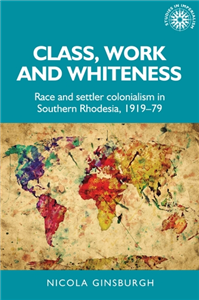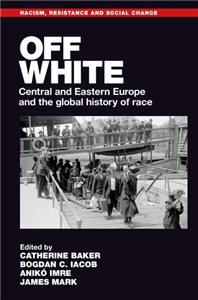Your Search Results
-
Promoted Content
-
Promoted Content
-
 Trusted Partner
Trusted Partner
-
 Trusted Partner
Trusted Partner
-
 Trusted Partner
Humanities & Social SciencesDecember 2022
Trusted Partner
Humanities & Social SciencesDecember 2022Class, work and whiteness
Race and settler colonialism in Southern Rhodesia, 1919–79
by Nicola Ginsburgh
This book offers the first comprehensive history of white workers from the end of the First World War to Zimbabwean independence in 1980. It reveals how white worker identity was constituted, examines the white labouring class as an ethnically and nationally heterogeneous formation comprised of both men and women, and emphasises the active participation of white workers in the ongoing and contested production of race. White wage labourers' experiences, both as exploited workers and as part of the privileged white minority, offer insight into how race and class co-produced one another and how boundaries fundamental to settler colonialism were regulated and policed. Based on original research conducted in Zimbabwe, South Africa and the UK, this book offers a unique theoretical synthesis of work on gender, whiteness studies, labour histories, settler colonialism, Marxism, emotions and the New African Economic History.
-
 Trusted Partner
Trusted Partner
-
 Trusted Partner
Trusted Partner
-
 Trusted Partner
Humanities & Social SciencesMay 2024
Trusted Partner
Humanities & Social SciencesMay 2024Off white
Central and Eastern Europe and the global history of race
by Catherine Baker, Bogdan C. Iacob, Anikó Imre, James Mark
This volume foregrounds racial difference as a key to an alternative history of the Central and Eastern European region, which revolves around the role of whiteness as the unacknowledged foundation of semi-peripheral nation-states and national identities, and of the region's current status as a global stronghold of unapologetic white, Christian nationalisms. Contributions address the pivotal role of whiteness in international diplomacy, geographical exploration, media cultures, music, intellectual discourses, academic theories, everyday language and banal nationalism's many avenues of expressions. The book offers new paradigms for understanding the relationships among racial capitalism, populism, economic peripherality and race.
-
 Trusted Partner
2023
Trusted Partner
2023The big PTAheute Handbook
Practical knowledge for the pharmacy
by Edited by Dr. Iris Milek
Already in its 3rd edition, the PTAheute handbook presents the essence of practical pharmacy knowledge and is becoming the standard work for a practical pharmacy. PTAheute authors contribute their professional experience and bundle the most important facts, in the proven manner of the trade journal PTAheute: ■ Comprehensibly prepared content facilitates putting knowledge effectively into practice. ■ Infographics help readers understand the contexts. ■ Yellow boxes provide a quick overview. ■ Pictures and graphic design increase reading pleasure. The content on multiple sclerosis or on the various aspects of Covid-19 is new to the 3rd edition. The chapters on „Antibiotics“ and „Interactions“ have been completely restructured and revised and all other content has been brought fully up to date. The PTAheute handbook – the reliable companion in everyday pharmacy life!
-
 Trusted Partner
Trusted Partner
-
 Trusted Partner
Humanities & Social SciencesSeptember 2020
Trusted Partner
Humanities & Social SciencesSeptember 2020A global history of white nationalism
by Daniel Geary, Camilla Schofield, Jennifer Sutton, John Solomos, Satnam Virdee, Aaron Winter
-
 Trusted Partner
Trusted Partner
-
 Trusted Partner
May 2022
Trusted Partner
May 2022Manege frei für Lili
by Lili Paul-Roncalli, Rosa Schwarz
Spätestens seit ihrem Sieg bei Let’s Dance 2020 kennt fast jeder die Artistin Lili Paul-Roncalli. In ihrer beeindruckenden Autobiografie erzählt die 23-Jährige, wie sie zum Star in der Manege geworden ist. Von der Kindheit im Circus Roncalli über erste Auftritte als Rollschuhakrobatin bis zu ihrem Erfolg als „Schlangenmensch“ im Zirkus ihres Vaters und auf anderen Bühnen in Europa. Ein aufregendes Buch, extra für Kinder geschrieben, mit vielen privaten Fotos und Hintergrundinfos. Ein Mutmachbuch für Kinder ab 10 Jahren, die vom Rampenlicht träumen. Von Lili Paul-Roncalli, Let's Dance-Gewinnerin und einer der bekanntesten Artistinnen Deutschlands. Mit exklusiven Fotos und vielen Hintergrundinfos.
-
 Trusted Partner
February 1982
Trusted Partner
February 1982Die Orte der Marguerite Duras
by Marguerite Duras, Michelle Porte, Justus Franz Wittkop
Marguerite Duras wurde am 4. April 1914 in der ehemaligen französischen Kolonie Gia Dinh, dem heutigen Vietnam als Marguerite Donnadieu geboren und starb am 3. März 1996 in Paris. Sie besuchte das Lycée Français in Saigon und machte 1931 Abitur. Ein Jahr später siedelte die Familie nach Paris um, wo sie an der Rechtswissenschaftlichen Fakultät der Universität Paris und an der École des Sciences Politiques studierte. Von 1935 bis 1941 arbeitete sie als Sekretärin im Ministère des Colonies. 1939 heiratete sie Robert Antelme. Beide waren ab 1940 in der Résistance aktiv. Antelme wurde später ins Konzentrationslager Dachau deportiert. 1943 erschien ihr Debütroman Les Impudents (Die Schamlosen) unter dem Pseudonym Marguerite Duras, welchem keine besondere Aufmerksamkeit in der Öffentlichkeit zuteil kam. Mit Un Barrage contre le Pacifique (Heiße Küste), das 1950 erschien, hatte Duras größeren Erfolg. Sie schrieb nicht nur Romane, sondern verfasste auch Theaterstücke und trat als Filmregisseurin in Erscheinung.
-
 Trusted Partner
Literature & Literary StudiesJanuary 2024
Trusted Partner
Literature & Literary StudiesJanuary 2024White before whiteness in the late Middle Ages
by Wan-Chuan Kao
-
 Trusted Partner
November 1984
Trusted Partner
November 1984Die Wahrheiten des G.G. Belli
Römer, Huren und Prälaten
by Giuseppe Gioacchino Belli, Otto Ernst Rock, Otto Ernst Rock
-
 Trusted Partner
June 2025
Trusted Partner
June 2025Der Wald lebt! (Band 1) - Gemeinsam gegen das Böse
Hilf den Drachenbrüdern und rette den Wald! - Humorvolle und bildstarke Abenteuer-Reihe für Kinder ab 7 Jahren - Wow! Das will ich lesen!
by Barbara van den Speulhof, Anka Schwelgin
Zwei Drachen für alle Fälle Feueralarm! Zwei Bösewichte haben ihre Beute im Wald vergraben und sind danach am Lagerfeuer eingeschlafen. Die gefährlichen Flammen breiten sich schnell aus. Doch der Wald und seine Bewohner sind nicht wehrlos. Die tapfere Esche Eschnapur setzt direkt mit dem Wurzelfon einen Notruf ab und alarmiert die wasserspeienden Drachenzwillinge. Schaffen sie es, den Brand zu löschen und die Übeltäter zu schnappen? 98,9% würden Loewe Wow!-Bücher weiterempfehlen (basierend auf einer Umfrage mit 1.263 Teilnehmer*innen) Das erste wurzelstarke Abenteuer Gemeinsam mit Loewe WOW! auf Verbrecherjagd ! Band 1 der neuen Reihe mit den beiden Drachen brüdern: Spaß und Action in einem spannenden Wald abenteuer für Kinder ab 7 Jahren . Mit prachtvollen Illustrationen von Anka Schwelgin, geschrieben von der Bestsellerautorin Barbara van den Speulhof. Leichter Leseeinstieg : Mit wenig Text, vielen Bildern und witzigen Dialogen werden auch Wenigleser angesprochen. Vierfarbige Illustrationen : durch die großflächigen witzigen Illustrationen erwacht die Geschichte zum Leben. Humorvolle Erzählweise : Barbara van den Speulhof zieht einen mit ihren lustigen Dialogen und abwechslungsreichen Charakteren mitten in die Geschichte.
-
 Trusted Partner
Literature & Literary StudiesDecember 2005
Trusted Partner
Literature & Literary StudiesDecember 2005Graham Swift
by Daniel Lea, Susan Williams
This book offers an accessible critical introduction to the work of Graham Swift, one of Britain's most significant contemporary authors. Through detailed readings of his novels and short stories from 'The Sweet Shop Owner' (1980) to 'The Light of Day' (2003), Daniel Lea lucidly addresses the key themes of history, loss, masculinity and ethical redemption, to present a fresh approach to Swift. This study proposes that one of the side-effects of modernity has been the destruction of traditional pathways of self and collective belief, leading to a loss of understanding between individuals about their duties to each other and to society. Swift's writing returns repeatedly to the question of what we can believe in when all the established markers of identity - family, community, gender, profession, history - have become destabilised. Lea suggests that Swift increasingly moves towards a notion of redemption through a lived ethical practice as the only means of finding solace in a world lacking a central symbolic authority. ;
-
 Trusted Partner
Humanities & Social SciencesJune 2020
Trusted Partner
Humanities & Social SciencesJune 2020Bellies, bowels and entrails in the eighteenth century
by Rebecca Anne Barr, Sylvie Kleiman-Lafon, Sophie Vasset, Anne Dunan-Page
-
 Trusted Partner
Humanities & Social SciencesSeptember 2020
Trusted Partner
Humanities & Social SciencesSeptember 2020Class, work and whiteness
by Nicola Ginsburgh, Alan Lester

































